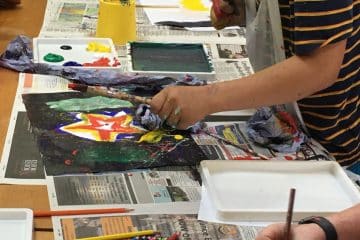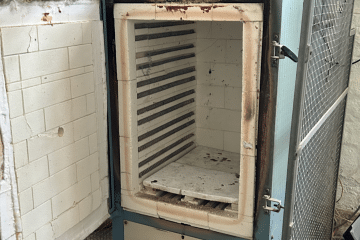As other charities do, every year we produce an annual report on what we’ve been up to, how we spent our money and who we supported. This report runs from April to March each year, and we’ve just released our latest report to March 2021.
You can download the full annual report below, or read on for the highlights. You can also read the full report at the bottom of the page.
Achievements and performance
We began this financial year in lockdown so Hive’s doors closed temporarily, some staff were furloughed and some continued to work from home. Our courses and projects closed ‘in person’ and we had to find a way to keep people engaged with the arts during this period, particularly those with mental and physical health issues exacerbated by the pandemic.
We were lucky to obtain additional funding during this period from a variety of sources to enable us to run a programme during this year. We were able to offer free sessions online, delivering 350 creative hours on Facebook and 200 via zoom to continue to engage and expand our audience. These included Woodwork, Painting and Drawing, Pottery, Printmaking, Arabic Calligraphy and Stained Glass. Lockdown with Liz started where our tutor live-streamed on Facebook showing us simple crafts and outdoor activities in her garden. This led to contact with the creative network and Liz became a regular guest on “Up for the Arts” on Radio Leeds.
We also developed zoom chat and craft groups for people who missed the interactions of coming to Hive. During this time we also delivered 20 Morrisons food boxes, provide by MHFA (Mental Health First Aid), to some of our most vulnerable users / members.
We purchased and delivered 36 tablets to refugee families, in partnership with Refugee Action. This meant that they were able to take part in our Flourish sessions online, and contribute to an online exhibition as part of refugee week. We have been delivering Flourish sessions via Zoom since June of last year. We have had a great response to these sessions from the participants, having worked with a wide range of people including refugee families, South Asian elders and others in the West Bowling community. During these sessions we have looked at what being in lockdown means and made paper houses lit with battery-operated tealights that we distributed through partner organisations and via post. We have had origami and paper craft sessions with families, as well as continuing with our foot project – exploring the journeys that the participants have made – to be exhibited in the autumn.
Our Thrive programme was put on hold for a while as one of the workers has long COVID. The work continues now on a smaller scale working with families and mental health partners.
Our members and volunteers really rallied round at this time, some of them making masks (over 300 of them) to sell online, raising £1,500 for Hive. One of our tutors made two large COVID pots inspired by the Grayson Perry Brexit pots, and invited service users to explore and represent their “Good” and “Bad” feelings about lockdown. One of our tutor’s sons, whilst being home schooled, developed a Hive@Home website so that our service users could download creative worksheets to accompany our online tutorials.
We installed large screen TVs and additional equipment at Hive so we could deliver courses in the building with people joining in from home via Zoom in preparation for when things started opening up again. We were also able to install this equipment at CommunityWorks in Undercliffe, Shine in West Bowling and Roshni Ghar in Keighley, alongside tablets to distribute to their clients. These clients included a group of unaccompanied young refugee men who were having a particularly bad time, enabling them to take part in creative activities to improve their English and wellbeing.
We adapted our premises to make them secure and safe for service users and restarted pre-booked drop-in sessions in July, meaning artists could access the equipment they need to start making again: after long periods of lockdown many people were keen to get back to Hive. We established a mixed-mode learning programme in September, with courses running for half the students in person, and half at home tuning in via Zoom – swapping round the following week, so each student had equal time in class. We also allowed people to come and pick up materials for classes during this period. Then in October, when we went back into lockdown, all sessions went back to being delivered on Zoom. As the year ended we were planning a cautious return to mixed-mode classes.
We were asked by the Baring Foundation to produce a report on our wellbeing work with BAMER (Black, Asian, Minority Ethnic and Refugee) communities as they are going to be changing their criteria to focus on this group in the near future and wanted some good practice information from groups already doing this work. The Baring Foundation have now released their report, “Culturally Minded and Ethnically Diverse”, in which Hive features (available on their website).
At the start of the year we were already developing a new website, and we launched this during lockdown to make it easier for members and non-members to book onto courses and access our facilities, as well as bringing all of our online activities together in one place.
Finally, since January we have been working with Bounceback foods, a Manchester-based charity working to fight food poverty in the UK, on their latest cookbook. Hive is representing Bradford as one of 20 organisations producing artwork for the book representing different cultures’ food. We are working with Roshni Ghar to produce artwork which will be displayed on the Bangladeshi recipe page.
Annual report and accounts
Read the full report:


